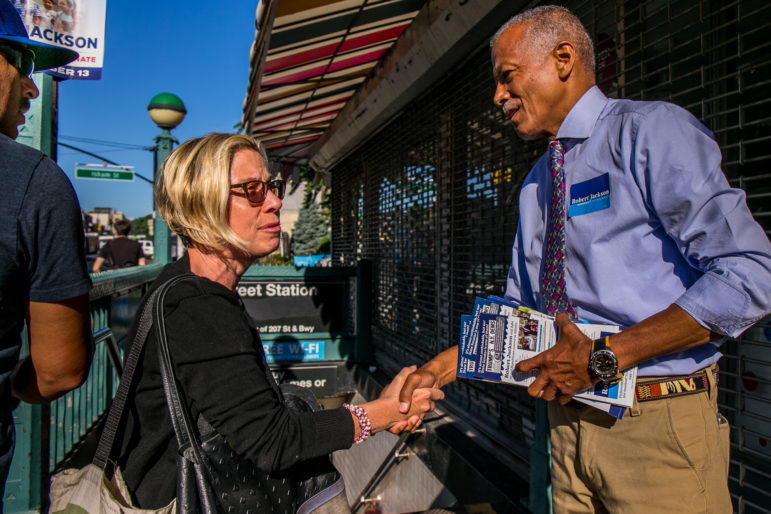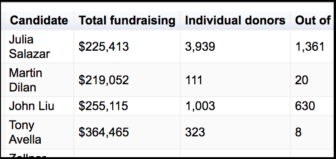
Adi Talwar
Most of Robert Jackson’s donations have come from out of state, but because they tend to be small checks, they represent only a fifth of his individual donation revenue.
Over half of donations to Robert Jackson’s State Senate campaign were given by people who do not live in New York State, a City Limits analysis of the Jackson campaign’s financial filings found. Americans residing in all 50 states and five foreign nations have donated to Robert Jackson’s campaign, making up 52.37 percent of the people who have pitched in to help the insurgent progressive defeat incumbent Marisol Alcantara in the September 13 primary.
Yet out-of-state donations represent only 21 percent of Jackson’s dollar total from individual donations—because the contributions tend to be very small.
While Alcantara has also drawn money from out of state, it is a less significant part of her fundraising — in part because her campaign finance relies more on unions, companies and PACs than individual donations.
But it’s the sheer number of out-of-state Jackson donors—some wielding very small checkbooks—that has stunned both his campaign and independent observers. His alliance with national progressive groups has granted his campaign a more visible platform than most other state-legislative races. And the mechanisms by which Jackson has attracted nationwide grassroots support point to a new progressive blueprint for seizing power from what they call “fake Democrats.”
Jackson’s large national donor base makes him an outlier even among the insurgent Senate candidates in the city, who share endorsements from the same roster of national progressive groups. And he is certainly running a different campaign than his opponent.
Alcantara is sitting on a war chest almost twice as Jackson’s, including nearly $300,000 transferred to her campaign from the Senate Independence Campaign Committee, the funding branch of the Independent Democratic Conference.
Alcantara’s ties to the IDC, a group of eight Democratic senators who caucused with Republicans until Governor Cuomo brokered a deal to break the coalition in April, have been the central point of contention in the campaign between the two otherwise similar candidates.
Jackson credited his support to “the national wave of people who want to see changes made at the federal, state and local level.”
“This is about all of us Democrats fighting to get leadership of the Senate,” he said.
Jackson’s campaign has broken state records for total number of donations. According to the latest campaign filings, Jackson for Senate 2018 has received some 8,300 contributions, and the number may be higher because the campaign has lumped small, cash donations into single line items. Alcantara has received around 900 donations. (For both candidates, the number of donations includes separate gifts from individual donors who write multiple checks.)
Jackson’s breakthrough was a 2017 endorsement from the liberal website Daily Kos, which funnels donations from around the country to progressive candidates it endorses. Through that website, which is linked to the progressive funding organ ActBlue, Jackson has received more donations—3,703—than any other endorsed candidate save Stacey Abrams, the African-American woman running for Georgia governor. That’s likely a function of how early he announced his candidacy, according to Daily Kos political editor Carolyn Fiddler. Jackson’s not raising money faster than other state-legislature candidates in this cycle, she said—but overall, progressive candidates are seeing record nationwide engagement.
“Our fundraising numbers have broken every record we’ve ever set, even last cycle during a presidential election,” said Fiddler. With months to go before the general election, the group has raised over $6 million for candidates running in this election cycle. The Jackson campaign has also been boosted by support from progressive groups energized in the aftermath of Trump’s victory, including True Blue NY, the Progressive Change Campaign Committee, the Working Families Party, the Creative Resistance and local Indivisible chapters.
Jackson campaign consultant Richard Fife said the campaign decided early that they would try to get their message out nationally, but that the response’s magnitude has been a shock. “I’ve been doing this a long time, and to me it was amazing,” he said. “Conceptually, I understood the idea of people giving to a congressional race around the country…but why would people in other states care about a New York legislator?”
For his opponent, the number of out-of-state donors for Jackson “makes you question what the powers…are behind him,” said Alcantara campaign consultant Michael Oliva. “Why are so many people from out of state interested in this race?”
“When you’re more concerned about rhetoric in the country as opposed to the real flesh and blood people who live in your district, you’re not getting things done,” said Oliva. State-level candidates who echo the Working Families Party’s call to eliminate the Immigration and Customs Enforcement Agency are one example of NYC politicians placing rhetoric over pragmatism, he said, given that they have no power to do away with a federal agency. Jackson has backed that policy, along with gubernatorial candidate Cynthia Nixon, AG candidate Zephyr Teachout, and other IDC challengers.
But for Inwood resident Maggie Clarke, who has been at the forefront of anti-rezoning protests in her neighborhood, the ZIP Code from which donations are coming matters much less than who is giving them: She’s worried about the Real Estate Board of New York’s influence on the elections.
“It’s important to find out how much each candidate is getting from real estate,” she said. “I don’t assign a great deal of meaning to the out-of-state donor figure.” The Real Estate Board PAC has given $15,000 directly to Alcantara and over $200,000 to the Senate Independence Campaign Committee, one of Alcantara’s largest funders.
Among the State Senate campaigns of five insurgent progressives—Jackson, Alessandra Biaggi, John Liu, Zellnor Myrie, Jessia Ramos, Jasmine Robinson, Julia Salazar—only Jackson and Liu (who is challenging Sen. Tony Avella, another former IDC member) received most of their individual donations from out of state, though Biaggi (IDC co-founder Jeff Klein’s challenger) got about half her checks from outside New York. Myrie, Ramos and Robinson are challenging the former IDC members Sen. Jesse Hamilton, Sen. Jose Peralta and Sen. Diane Savino, respectively. Salazar is challenging Sen. Martin Dilan, who was not a member of the IDC.
Overall, more donations have flowed to Jackson than to the other four progressive candidates: The Jackson campaign received 8,220 individual donations through September 4—1,685 more than donated to runner-up Biaggi.
However, while they are plentiful in number, Jackson’s donations are smaller on average dollar amounts than what some of his peers have collected. Biaggi, for instance, has outraised Jackson by $91,136.70 among individual donors in her bid to unseat Klein.
Overall, progressive insurgents are raising more from out of state than incumbents. But incumbents tend to attract larger donations: For incumbents, the average individual donations was $510. For insurgents, it was $72. Isolating the out-of-state money, donations to incumbents averaged $406 while those to insurgents averaged around $30.
While there’s no rule of thumb about where candidates should raise the bulk of their money, it’s generally a better strategy to try to raise as much money as possible inside their district, says Blair Horner, executive director of the nonpartisan political watchdog group NYPIRG. But as it stands, “donor limits are so high that it doesn’t make sense for candidates to go door to door. Instead, candidates are incentivized to approach big donors, wherever they live,” he says.
Those incentives are holding true for incumbents. But riding a swell of disillusionment with Trump-era politics, progressive primary challengers like Jackson are placing their bets on a different strategy.










2 thoughts on “Out-of-State Donors Playing a Key Role in Insurgent Senate Campaigns”
Pingback: The Left and Electoral Politics: Part I, Changing the System From the Inside – my term papers for anyone who wants to read them
Pingback: The Significance of Julia Salazar running as a “Socialist” Democrat – Leftist Critic